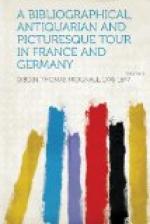‘Seint George! seint George!’
thay criden[N] on height,
And seide, ‘welcome oure kynges righte.’
The Frensshe pepulle of that Cite
Were gederid by thousandes, hem to see.
Thay criden[N] alle welcome in fere,
’In siche tyme mote ye entre here,
Plesyng to God that it may be,
And to vs pees and vnyte.’
And of that pepulle, to telle the trewthe,
It was a sighte of fulle grete ruthe.
Mykelle of that folke therynne
Thay weren[O] but verrey bonys and skynne.
With eyen holowgh and[P] nose scharpe,
Vnnethe thay myght brethe or carpe,
For her colowris was[Q] wan as lede,
Not like to lyue but sone ben dede.
Disfigurid pateronys[R] and quaynte,
And as[S] a dede kyng thay weren paynte.
There men myght see an[T] exampleyre,
How fode makith the pepulle faire.[U]
In euery strete summe lay dede,
And hundriddis krying aftir brede.
And aftir long many a day,
Thay deyde as[V] faste as[W] they myght be lad away.
Into[X] that way God hem wisse,
That thay may come to his blisse! amen.
Now[Y] wille y more spelle,
And of the duke of exestre to[Z] telle.
To that Castelle firste he rode,
And sythen[AA] the Cite alle abrode;
Lengthe and brede he it mette,
And rich baneris he[AB] vp sette.
Vpon the porte seint Hillare
A Baner of the Trynyte.
And at[AC] the port Kaux he sette evene
A baner of the quene of heven.
And at[AD] port martvile he vppyght Of seint George a baner bryght.
He sette vpon the Castelle to[AE] stonde
The armys of Fr[a]unce and Englond.
And on the Friday in the mornynge
Into that Cite come oure kynge.
And alle the Bisshoppis in her aray,
And vij. abbottis with Crucchis[AF] gay;
xlij.[AG] crossis ther were of Religioune[AH],
And seculere, and alle thay went a precessioun,
Agens that prince withoute the toune,
And euery Cros as thay stode
He blessid hem with milde mode,
And holy water with her hande
Thay gaf the prince of oure lande.
And at[AI] the porte Kaux so wide
He in passid withoute[AJ] pride;
Withoute pipe or bemys blaste,
Our kyng worthyly he in paste.
And as a conquerour in his righte
Thankyng[AK] euer god almyghte;
And alle the pepulle in that Citie
‘Wilcome our[AL] lorde,’ thay seide, ’so fre!
Wilcome into[AM] thyne owne righte,
As it is the[AN] wille of[AO] god almyght.’
With that thay kryde alle ’nowelle!’
Os[AP] heighe as thay myght yelle.
He rode vpon a browne stede,
Of blak damaske was his wede.
A peytrelle[AQ] of golde fulle bryght
Aboute his necke hynge[AR] doun right,
And a pendaunte behynd him dide[AS] honge
Vnto the erthe, it was so longe,
And thay that neuer before hym dide[AT] see,
Thay knew by chere[u] wiche was he.
And seide, ‘welcome oure kynges righte.’
The Frensshe pepulle of that Cite
Were gederid by thousandes, hem to see.
Thay criden[N] alle welcome in fere,
’In siche tyme mote ye entre here,
Plesyng to God that it may be,
And to vs pees and vnyte.’
And of that pepulle, to telle the trewthe,
It was a sighte of fulle grete ruthe.
Mykelle of that folke therynne
Thay weren[O] but verrey bonys and skynne.
With eyen holowgh and[P] nose scharpe,
Vnnethe thay myght brethe or carpe,
For her colowris was[Q] wan as lede,
Not like to lyue but sone ben dede.
Disfigurid pateronys[R] and quaynte,
And as[S] a dede kyng thay weren paynte.
There men myght see an[T] exampleyre,
How fode makith the pepulle faire.[U]
In euery strete summe lay dede,
And hundriddis krying aftir brede.
And aftir long many a day,
Thay deyde as[V] faste as[W] they myght be lad away.
Into[X] that way God hem wisse,
That thay may come to his blisse! amen.
Now[Y] wille y more spelle,
And of the duke of exestre to[Z] telle.
To that Castelle firste he rode,
And sythen[AA] the Cite alle abrode;
Lengthe and brede he it mette,
And rich baneris he[AB] vp sette.
Vpon the porte seint Hillare
A Baner of the Trynyte.
And at[AC] the port Kaux he sette evene
A baner of the quene of heven.
And at[AD] port martvile he vppyght Of seint George a baner bryght.
He sette vpon the Castelle to[AE] stonde
The armys of Fr[a]unce and Englond.
And on the Friday in the mornynge
Into that Cite come oure kynge.
And alle the Bisshoppis in her aray,
And vij. abbottis with Crucchis[AF] gay;
xlij.[AG] crossis ther were of Religioune[AH],
And seculere, and alle thay went a precessioun,
Agens that prince withoute the toune,
And euery Cros as thay stode
He blessid hem with milde mode,
And holy water with her hande
Thay gaf the prince of oure lande.
And at[AI] the porte Kaux so wide
He in passid withoute[AJ] pride;
Withoute pipe or bemys blaste,
Our kyng worthyly he in paste.
And as a conquerour in his righte
Thankyng[AK] euer god almyghte;
And alle the pepulle in that Citie
‘Wilcome our[AL] lorde,’ thay seide, ’so fre!
Wilcome into[AM] thyne owne righte,
As it is the[AN] wille of[AO] god almyght.’
With that thay kryde alle ’nowelle!’
Os[AP] heighe as thay myght yelle.
He rode vpon a browne stede,
Of blak damaske was his wede.
A peytrelle[AQ] of golde fulle bryght
Aboute his necke hynge[AR] doun right,
And a pendaunte behynd him dide[AS] honge
Vnto the erthe, it was so longe,
And thay that neuer before hym dide[AT] see,
Thay knew by chere[u] wiche was he.




